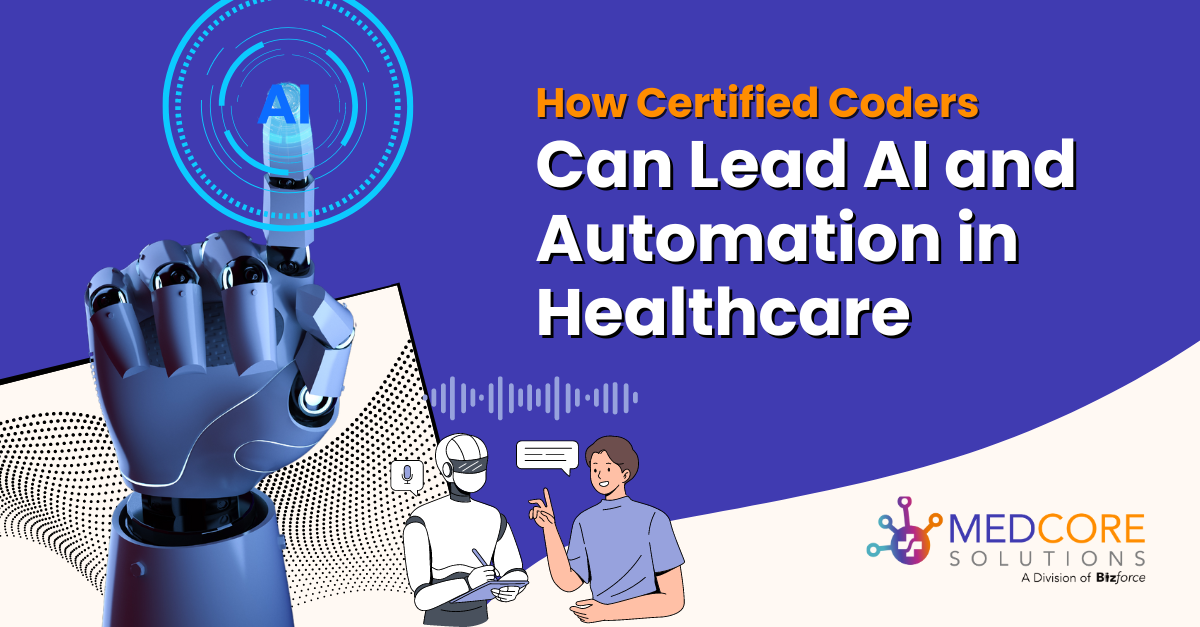AI adoption in healthcare continues to rise, with 79% of healthcare organizations now utilizing AI technology, according to a study commissioned by Microsoft through IDC. The healthcare sector is undergoing a transformative era fueled by rapid advancements in technology, particularly AI and automation. These innovations are revolutionizing everything from patient care to administrative processes. Amid these changes, certified medical coders are emerging as crucial leaders who can spearhead the integration of AI and automation. In this blog, we’ll explore how these professionals can use their expertise to ensure that AI-driven technologies are implemented successfully, keeping healthcare systems efficient, accurate, and patient-centered.
The Evolving Role of Certified Coders in Healthcare

Traditionally, medical coders have played a crucial role in the healthcare system by translating patient records and clinical documentation into standardized codes used for billing, insurance claims, and statistical analysis. Their work ensures that healthcare providers are reimbursed accurately. They record data consistently. Through their documented patient conditions, patients receive appropriate care.
However, with the advent of AI and automation, the role of medical coders is evolving. These technologies can now perform many of the tasks traditionally handled by coders. Technologies can now identify relevant codes from clinical documentation. They can predict the most appropriate codes based on historical data. While this might seem like a threat to the profession, it presents an opportunity for certified coders to take on more strategic and leadership roles in healthcare organizations.
MedCore’s commitment to staying ahead in the healthcare industry means that our coders are well-trained in the latest technologies. They can take on strategic roles within organizations. Our certified coders work closely with healthcare providers to implement AI tools. What’s more, they also optimize workflows, improve data accuracy, and ultimately enhance patient care. As leaders in remote medical coding, MedCore’s professionals are redefining the role of coders in the era of AI and automation. Our medical coders prove that technology and human expertise can work hand in hand to drive the future of healthcare.
AI and Automation in Healthcare Coding
Automation and AI technologies have the potential to revolutionize healthcare coding by improving accuracy, efficiency, and consistency. Artificial Intelligence algorithms can analyze vast amounts of data to identify patterns and correlations that may not be immediately apparent to human coders. For instance, AI can help identify trends in patient diagnoses or treatments. This leads to more accurate coding and better-informed clinical decisions.
Automation, on the other hand, can streamline repetitive and time-consuming tasks, such as data entry and code assignment. By automating these processes, healthcare organizations can reduce errors. These speed up billing cycles and free up coders to focus on more complex and value-added tasks.
However, the successful implementation of AI and automation in healthcare coding requires the expertise of certified coders. These professionals have an in-depth understanding of medical terminology. Moreover, they are well-exposed to coding standards and the intricacies of healthcare documentation. This expertise makes certified coders essential for guiding the development and deployment of these AI and automation.
Certified Coders as Leaders in AI Integration

Certified coders are uniquely positioned to lead the integration of AI and automation in healthcare coding for several reasons:
Expert Knowledge of Coding Standards
Certified coders possess a deep understanding of coding systems such as ICD-10, CPT, and HCPCS. They are also well-informed about the guidelines set by organizations like the American Health Information Management Association (AHIMA) and the American Academy of Professional Coders (AAPC). This expertise is critical for training AI systems to accurately interpret and apply these coding standards. Therefore, by collaborating with AI developers, coders can ensure that the algorithms adhere to the latest coding guidelines.
Quality Control and Validation
Furthermore, even with the most advanced AI systems, there is still a need for human oversight to ensure accuracy and reliability. Certified coders can serve as quality control specialists. They can validate the codes generated by AI systems and identify any discrepancies or errors. This ensures that healthcare organizations remain compliant with regulations.
Training and Education
As healthcare organizations adopt AI and automation technologies, there will be a growing need for training and education to help staff adapt to these changes. Certified coders can take on the role of trainers. They can educate other healthcare professionals on how to use AI tools effectively. Moreover, they can also help the team interpret the outputs these systems generate. This not only empowers the workforce but also helps to foster a culture of continuous learning and adaptation within the organization.
Data Management and Analytics
AI and automation generate vast amounts of data that are useful for various purposes. These data can improve patient care and optimize operational efficiency. Certified coders can play a key role in managing and analyzing this data. They can ensure that it is accurate, complete, and relevant. By using their knowledge of coding and clinical documentation, coders can help healthcare organizations extract valuable insights from their data, leading to better decision-making and improved outcomes.
Advocacy and Ethical Considerations
The integration of AI and automation in healthcare raises important ethical considerations, particularly regarding patient privacy, data security, and the potential for bias in AI algorithms. Certified coders can act as advocates for ethical practices, ensuring that these technologies are implemented in a way that respects patient rights and upholds the highest standards of care. Their input is crucial in developing policies and guidelines that govern the use of AI and automation in healthcare coding.
Conclusion

As AI and automation continue to transform the healthcare industry, certified coders have a unique opportunity to lead the way in integrating these technologies into the coding process. By using their expertise, certified coders can ensure that AI systems are accurate, reliable, and aligned with industry standards. They can also play a crucial role in training and educating other healthcare professionals, managing and analyzing data, and advocating for ethical practices.
Certified coders who embrace AI and automation secure their place in the future of healthcare. What’s more, they also contribute to the development of a more efficient, accurate, and patient-centered system. The future of healthcare coding is bright, and certified coders are at the forefront of this exciting transformation.
Ready to elevate your healthcare operations with cutting-edge expertise? Partner with MedCore’s certified medical coders, who are leading the way in integrating AI and automation into healthcare. Our remote coding professionals are not just adapting to the future—they’re shaping it. Let us help you enhance efficiency, accuracy, and patient care in your organization. Contact MedCore today and discover how our coders can drive your success in the evolving healthcare landscape! Click here.

